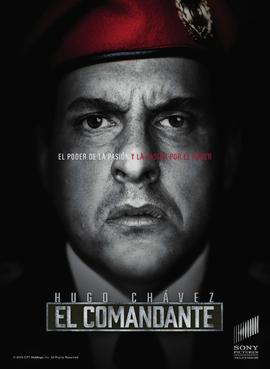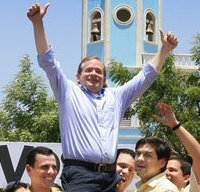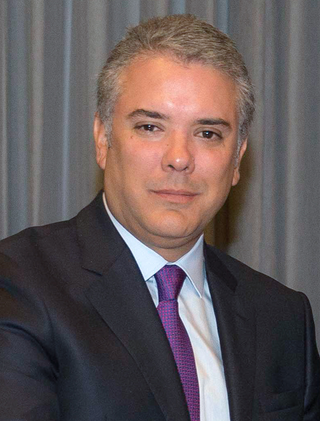Related Research Articles

The Supreme Justice Tribunal is the highest court of law in the Bolivarian Republic of Venezuela and is the head of the judicial branch. As the independence of the Venezuelan judiciary under the regime of Nicolás Maduro is questioned, there have recently been many disputes as to whether this court is legitimate.

The Democratic Unity Roundtable was a catch-all electoral coalition of Venezuelan political parties formed in January 2008 to unify the opposition to President Hugo Chávez's United Socialist Party of Venezuela in the 2010 Venezuelan parliamentary election. A previous opposition umbrella group, the Coordinadora Democrática, had collapsed after the failure of the 2004 Venezuelan recall referendum.

El Comandante is a Colombian television series created by Sony Pictures Television. It is based on the life of the late Venezuelan President, Hugo Rafael Chávez Frias. It stars Andrés Parra as the titular character.

Presidential elections were held in Venezuela on 20 May 2018, with incumbent Nicolás Maduro being declared re-elected for a second six-year term. The original electoral date was scheduled for December 2018 but was subsequently pulled ahead to 22 April before being pushed back to 20 May. Some analysts described the poll as a sham election, as many prominent opposition parties had been barred from participating in it. The elections had the lowest voter turnout in Venezuela's democratic era.
Parliamentary elections were held in Venezuela on 6 December 2020. Aside from the 167 deputies of the National Assembly who are eligible to be re-elected, the new National Electoral Council president announced that the assembly would increase by 110 seats, for a total of 277 deputies to be elected.

Rafaela Requesens is Venezuelan activist and student leader, former president of the Federation of the Students Center of the Central University of Venezuela (FCU–UCV) and an organiser of student protests in Venezuela. She was a prominent figure of the 2017 Venezuelan protests, along with her brother, Juan Requesens, and has since become a prominent democracy activist.

Juan Gerardo Antonio Guaidó Márquez is a Venezuelan opposition politician. He belonged to the social-democratic party Popular Will, and was a federal deputy to the National Assembly representing the state of Vargas.
The Statute Governing the Transition to Democracy to Re-establish the Validity of the Constitution of the Bolivarian Republic of Venezuela is a statute adopted by the Venezuelan National Assembly that defines the "duration of a transition government and its political and economic responsibilities". Approved on 5 February 2019, through its seven chapters and thirty-nine articles, the Transition Statute "governs the installation of a provisional Government and the convocation of free elections", and "establishes the election of new rectors of the National Electoral Council, new magistrates of the Supreme Tribunal of Justice and new representatives of the Citizen Power." It also establishes that – in the absence of a constitutionally elected president – the National Assembly President is the Acting President of Venezuela.

José Manuel Olivares is a Venezuelan politician and oncologist. In 2015, he was elected deputy of the National Assembly from Vargas. He is the president of the National Assembly's Health Subcommission, where he has spearheaded the National Health Crisis Provision Law and directed humanitarian aid to counteract the effects of the medicine shortage in Venezuela. He is also the president of the Permanent Commission on Integral Family Development. Olivares has been a major figure in the opposition movement against the government of Nicolás Maduro. In June 2018, Olivares and his family fled to Colombia, where he has helped direct the shipment of humanitarian aid to Venezuela.
The negotiations during the crisis in Venezuela are the negotiation and dialogue attempts and processes between the government of Nicolás Maduro and the Venezuelan opposition. Although numerous dialogue processes and roundtables have taken place, by 2023 none had been effective in achieving a solution to the country's crisis.
Con El Mazo Dando is a Venezuelan television programme. It is transmitted every Wednesdays at 7pm on Venezolana de Televisión and TVes. It is hosted by Diosdado Cabello. Its sister broadcast Nos Vemos en la Radio is also broadcast on Radio Nacional de Venezuela.
The 2020 Venezuelan National Assembly Delegated Committee election was to be held in the ordinary session of the National Assembly on 5 January, in which 160 deputies were to elect the legislature's board of directors for the year 2020–21: the president, the first and second vice presidents, the secretary and the deputy secretary. It was the last such election of the IV National Assembly.

Elvis Eduardo Hidrobo Amoroso is a Venezuelan politician and lawyer who currently serves as the President of the National Electoral Council since 24 August 2023. He previously served as Comptroller General of the Republic and held the presidency of the Republican Moral Council, also known as the Moral Power. In August 2017, he was elected as first and second vice president of the 2017 Constituent National Assembly and served until October 2017. He also served as a deputy to the National Assembly for the United Socialist Party of Venezuela (PSUV).

The IV National Assembly of Venezuela was a meeting of the legislative branch of Venezuelan federal government, comprising the National Assembly of Venezuela. It is meeting in Caracas after 2015 Venezuelan parliamentary election.

Juan Pablo Isidoro Guanipa Villalobos is a Venezuelan lawyer and politician who served as deputy and First Vice President of the National Assembly, leader of the Justice First political party and former governor of Zulia. He was a presidential candidate in the 2018 elections until boycott. Guanipa is the regional coordinator of the Justice First party in Zulia and chairs the Maracaibo Posible foundation.

Gonzalo Himiob Santomé is a Venezuelan lawyer, writer and activist. He is a founding member of the non-governmental organization Foro Penal and is currently its vice-president.
Indira Maira Alfonzo Izaguirre is a Venezuelan judge who until May 2020 served as the first vice president of the Supreme Tribunal of Justice of Venezuela (TSJ) and as president of the Electoral Chamber. In June 2020, she sworn in as chief rector and president of the National Electoral Council (CNE) by the TSJ, to organize 2020 Venezuelan parliamentary election. Her position in the CNE is contested by the National Assembly, organism in charge of selecting the CNE members, but the parliament was deemed in “unconstitutional omission” by the TSJ.

Regional and municipal elections were held in Venezuela on 21 November 2021. In the elections, all executive and legislative positions of the 23 federal entities, as well as that of the 335 municipalities of the country, were renewed.

Iván Duque's term as the 33rd president of Colombia began with his inauguration on August 7, 2018, and ended on August 7, 2022. Duque a right-wing leader from Bogotá, D.C., took office after a narrow victory over the incumbent left-wing leader of Human Colombia. Gustavo Petro in the 2018 presidential election. Duque was succeeded by leftist leader Gustavo Petro, who won the 2022 presidential election.

Corina Yoris Villasana is a Venezuelan philosopher, professor and politician, who was the Unitary Platform candidate in the 2024 Venezuelan presidential election, as the replacement for María Corina Machado, who was politically disqualified. Yoris was unable to register and was replaced by Edmundo González Urrutia.
References
- ↑ "Juan Manuel Raffalli pidió a la oposición fijar una posición única" [Juan Manuel Raffalli asked the opposition to establish one position]. El Nacional (in Spanish). 5 February 2018. Retrieved 9 March 2019.
- ↑ Leon, Ibis (14 November 2018). "Juan Raffalli: El 10 de enero debe ser el catalizador para un acuerdo político electoral" [Juan Raffalli: January 10 should be the catalyst for an electoral political agreement]. Efecto Cocuyo (in Spanish). Archived from the original on 21 December 2018. Retrieved 9 March 2019.
- 1 2 3 4 5 "Juan Manuel Raffalli Arismendi: Professor, UCAB, UMA, and IESA". Americas Society: Council of the Americas . Retrieved 9 March 2019.
- 1 2 3 4 5 "Juan Manuel Raffalli Arismendi" (in Spanish). Centro Empresarial de Conciliación y Arbitraje (CEDCA). Retrieved 9 March 2019.
- ↑ Tomillo C., Manuel (4 February 2018). "Asesor de la MUD en el diálogo solicitó que elecciones presidenciales sean después de abril" [Advisor to the MUD in the dialogue requested that presidential elections be after April]. Caraota Digital (in Spanish). Retrieved 9 March 2019.[ permanent dead link ]